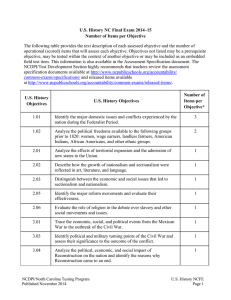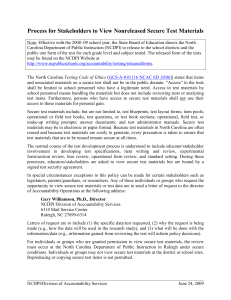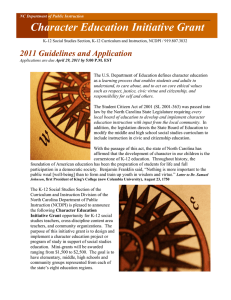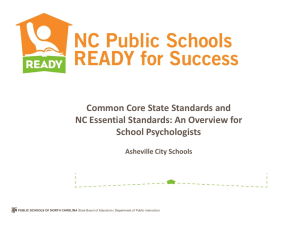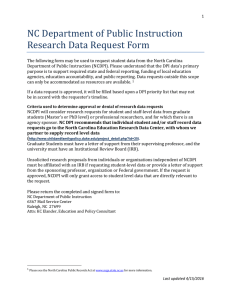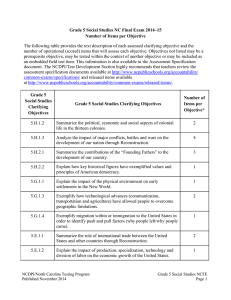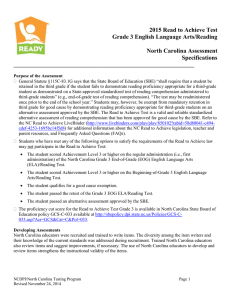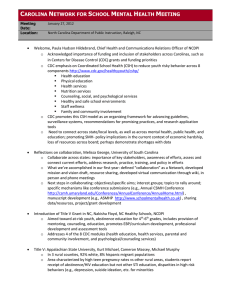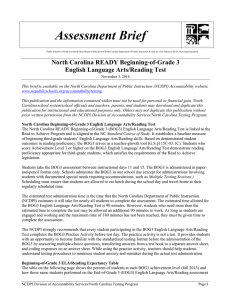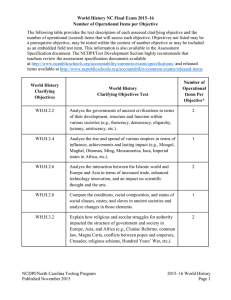I’ve heard the Common Core is required by the
advertisement
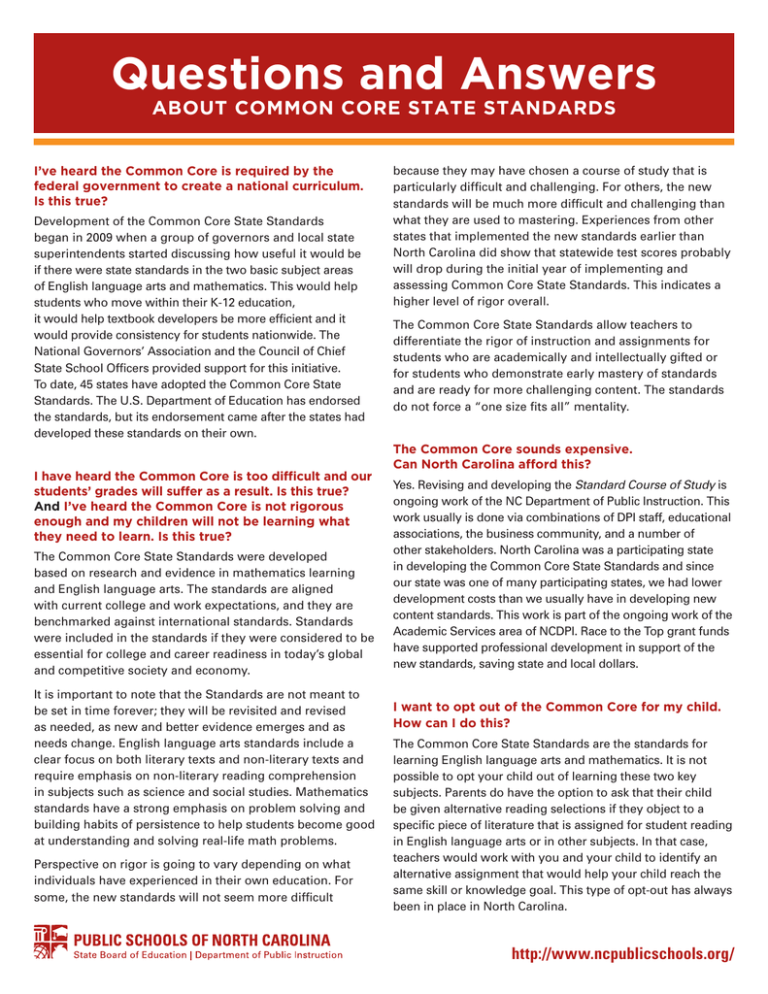
Questions and Answers ABOUT COMMON CORE STATE STANDARDS I’ve heard the Common Core is required by the federal government to create a national curriculum. Is this true? Development of the Common Core State Standards began in 2009 when a group of governors and local state superintendents started discussing how useful it would be if there were state standards in the two basic subject areas of English language arts and mathematics. This would help students who move within their K-12 education, it would help textbook developers be more efficient and it would provide consistency for students nationwide. The National Governors’ Association and the Council of Chief State School Officers provided support for this initiative. To date, 45 states have adopted the Common Core State Standards. The U.S. Department of Education has endorsed the standards, but its endorsement came after the states had developed these standards on their own. I have heard the Common Core is too difficult and our students’ grades will suffer as a result. Is this true? And I’ve heard the Common Core is not rigorous enough and my children will not be learning what they need to learn. Is this true? The Common Core State Standards were developed based on research and evidence in mathematics learning and English language arts. The standards are aligned with current college and work expectations, and they are benchmarked against international standards. Standards were included in the standards if they were considered to be essential for college and career readiness in today’s global and competitive society and economy. It is important to note that the Standards are not meant to be set in time forever; they will be revisited and revised as needed, as new and better evidence emerges and as needs change. English language arts standards include a clear focus on both literary texts and non-literary texts and require emphasis on non-literary reading comprehension in subjects such as science and social studies. Mathematics standards have a strong emphasis on problem solving and building habits of persistence to help students become good at understanding and solving real-life math problems. Perspective on rigor is going to vary depending on what individuals have experienced in their own education. For some, the new standards will not seem more difficult because they may have chosen a course of study that is particularly difficult and challenging. For others, the new standards will be much more difficult and challenging than what they are used to mastering. Experiences from other states that implemented the new standards earlier than North Carolina did show that statewide test scores probably will drop during the initial year of implementing and assessing Common Core State Standards. This indicates a higher level of rigor overall. The Common Core State Standards allow teachers to differentiate the rigor of instruction and assignments for students who are academically and intellectually gifted or for students who demonstrate early mastery of standards and are ready for more challenging content. The standards do not force a “one size fits all” mentality. The Common Core sounds expensive. Can North Carolina afford this? Yes. Revising and developing the Standard Course of Study is ongoing work of the NC Department of Public Instruction. This work usually is done via combinations of DPI staff, educational associations, the business community, and a number of other stakeholders. North Carolina was a participating state in developing the Common Core State Standards and since our state was one of many participating states, we had lower development costs than we usually have in developing new content standards. This work is part of the ongoing work of the Academic Services area of NCDPI. Race to the Top grant funds have supported professional development in support of the new standards, saving state and local dollars. I want to opt out of the Common Core for my child. How can I do this? The Common Core State Standards are the standards for learning English language arts and mathematics. It is not possible to opt your child out of learning these two key subjects. Parents do have the option to ask that their child be given alternative reading selections if they object to a specific piece of literature that is assigned for student reading in English language arts or in other subjects. In that case, teachers would work with you and your child to identify an alternative assignment that would help your child reach the same skill or knowledge goal. This type of opt-out has always been in place in North Carolina. http://www.ncpublicschools.org/ Will the Common Core mean that my child’s personal information is entered in a national database. Is that true? No. The Common Core State Standards are standards for what students should learn in mathematics and English language arts. Data collections are not a part of the Common Core. There are data collected on students regarding grades, demographic information and participation in various programs at school. These data are kept secure and confidential under the following laws, guidelines and agreements: The North Carolina Department of Public Instruction (NCDPI) is committed to protecting all confidential student information for which it is responsible. The Personally Identifiable Information (PII), or private information, collected and used by NCDPI is required and necessary in order to comply with federal or state laws or for other legitimate purposes. NCDPI’s data security measures are aligned with both federal and state laws. Relevant Laws The Family Educational Rights and Privacy Act (FERPA) [20 U.S.C. § 1232g; 34 CFR Part 99] is a federal law that protects the privacy of student education records. The law applies to all schools that receive funds under an applicable program of the U.S. Department of Education and restricts the release of private information without the consent of the parent or eligible student. The Identity Theft Protection Act of 2005 (SL 2005-414/ SB 1048), was passed by the General Assembly and imposes certain obligations on state agencies concerning the collection, use and dissemination of Social Security Numbers (SSNs) and other PII. Internal Use of Private Data UIDs that are used for data cross-referencing between information systems. As this system was put in place over the past three years, other systems have shifted to using the UIDs for students and staff and dropped their dependence on SSNs as a cross-reference key. In addition to reducing the use and collection of SSNs, NCDPI has taken other steps to ensure the security of private data when it is used by agency staff. All NCDPI staff members are required to sign a confidentiality agreement annually that is witnessed by their Division Director. The Information Security Officer conducts periodic information security briefings for all staff, which cover the legal and policy aspects of handling PII. Attendance at one of these briefings annually is mandatory for all employees. External Use of Private Data To answer questions about student achievement level and program effectiveness, NCDPI is often asked to provide student level data. Whenever possible, NCDPI refers data requesters to the North Carolina Education Research Data Center (NCERDC), which provides de-identified data sets. When data including PII are required, such as for the Race to the Top (RttT) evaluation, all data releases must be approved by the State Superintendent or her designee. Only requests from researchers conducting studies for, or on behalf of, the students of North Carolina and who have partnered with an internal NCDPI sponsor are approved. If the data request is approved for PII about individuals, all requesters must adhere to the following requirements: • R equester is responsible for the information obtained – for using it appropriately, and only for authorized purposes. • R equester must not use the data for any other purpose or research other than the specific purpose stated in the request. Since the Identity Theft Protection Act restricts the use of SSNs by state government unless “authorized by law to do so or unless the collection of a SSN is otherwise imperative for the performance of the agency’s duties and responsibilities by law” [§ 132-1.8.(b)(1)], systems that use SSNs have been steadily eliminated from the NCDPI information system portfolio or modified to exclude SSNs. New systems added to the portfolio are only permitted to capture or retain SSNs by exception. • R equester must agree to comply with the provisions of the Family Education Rights & Privacy Act (FERPA). To minimize the need for the use of SSNs, NCDPI implemented a Unique ID (UID) system for students and staff as part of the NC CEDARS project to create a K-12 statewide longitudinal data system for education data. This system matches individual students and staff and assigns • T he requester may not share data and information provided by NCDPI with any other entity without prior written approval from NCDPI. • T he NCDPI Standard confidentiality agreement is required for all personnel who have access to the requested data. • If the requester deliberately or accidentally misuses the obtained information, the requester may lose access to data, and/or face dismissal or prosecution under the scope of all applicable federal and state laws. • D ata from NCDPI must not be taken outside the United States. • A Memorandum of Agreement (MOA) between NCDPI and any organization or individuals conducting educational research is required for the release of any PII about individuals. Results will not be displayed or distributed in a breakdown by student group where the number of students in the group is too small (fewer than five). In any group where the percentage of students is greater than 95% or less than 5%, the actual values may not be displayed because of federal privacy regulations (FERPA). • A t the close of the research, the data requester must verify, in writing, that the data set from NCDPI has been destroyed. The teachers at my child’s school said that they will be giving common exams this year. What are they? Common exams are not related to the Common Core State Standards. “Common exams” is a term that refers to new assessments being developed to measure teacher effectiveness. The common exams also are called measures of student learning and are given in classes where there is no other accountability measure provided through end-of-grade tests and end-of-course tests. The common exams may be used by teachers as a final exam in a course, but that is a local school board decision. Common exams or measures of student learning have been developed by local teachers and the NC Department of Public Instruction to show the impact of teacher performance on student learning. Why do we need to change content standards? As the economy and the world change, we need to change the standards for student learning to make sure that students are prepared for the future and not for the past. North Carolina has had a Standard Course of Study for many decades, and throughout those years, the standards have been evaluated and updated on a regular basis by the NC Department of Public Instruction in conjunction with the university and community college systems and local educators. The State Board of Education has the authority to adopt the Standard Course of Study, including the Common Core State Standards, for North Carolina public schools. Under the Common Core the high school math courses don’t include Algebra I and Algebra II or Geometry. Why not and how will this affect my child’s college chances? The name or title of the high school math courses under the Common Core State Standards are different, but the knowledge and skills in the old Algebra I, Algebra II and Geometry courses will still be taught in Math I, II and III. Universities and community colleges’ admissions departments are aware of this transition and that the skills needed for college success continue to be taught in North Carolina high schools.
